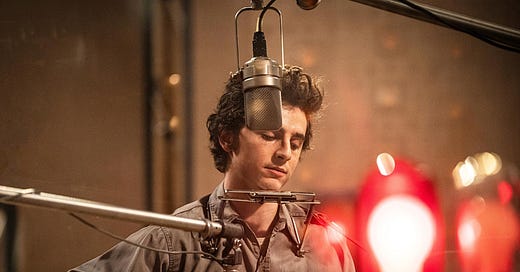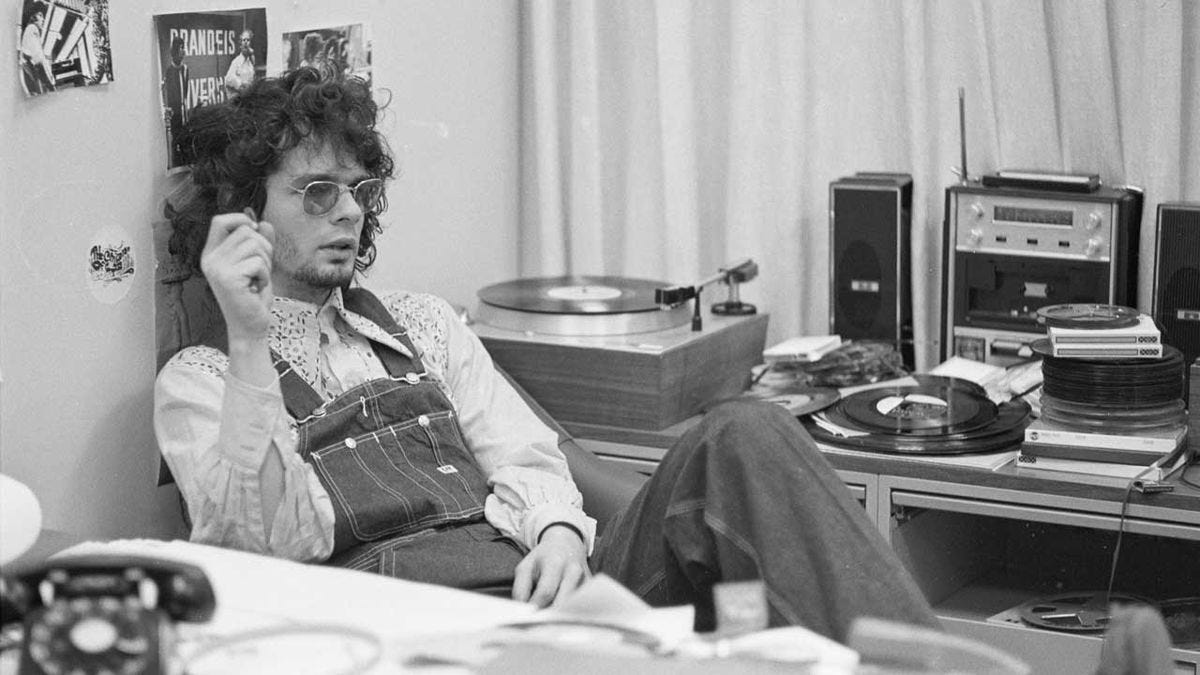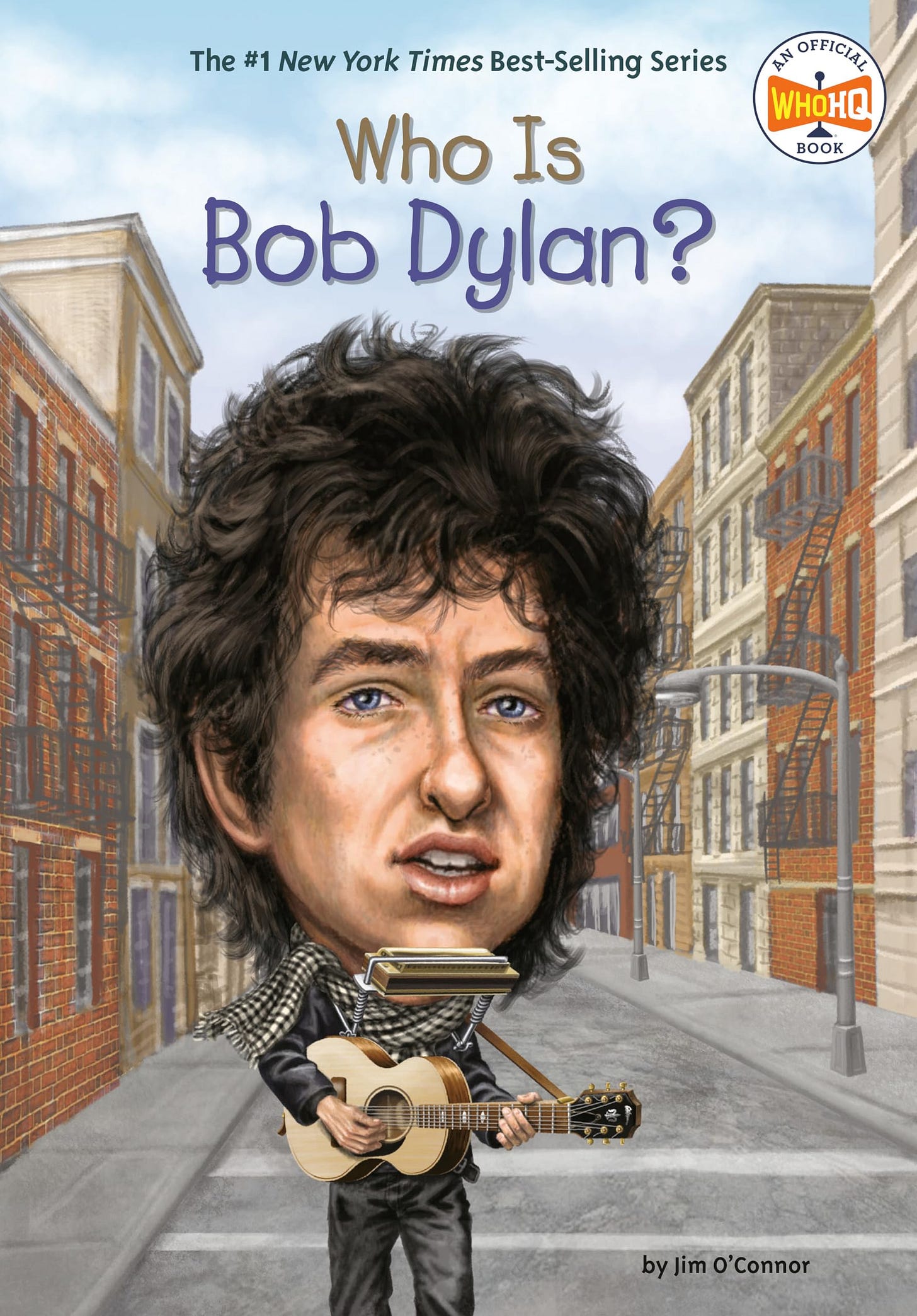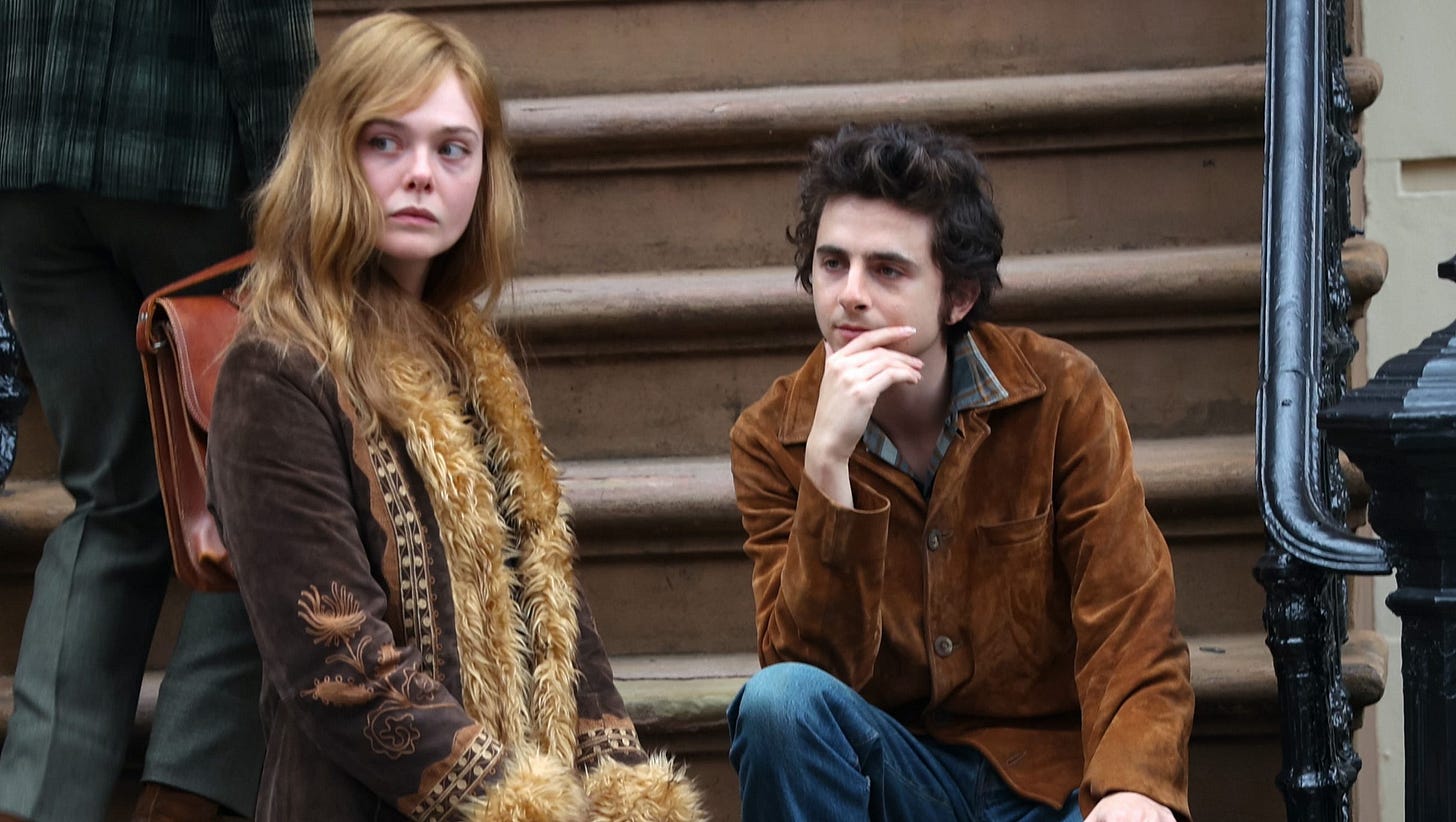I have listened to Bob Dylan almost every day since 1991 when I discovered Blood on the Tracks and bought The Bootleg Series, Vol. 1-3 at Nobody Beats the Wiz and played those three CDs over and over. Last week, I bought The Bootleg Series, Volume 16 on vinyl. I’ve read most of the major biographies (Ian Bell’s two volumes are the best), Chronicles Volume 1, and the great Dylanologists book about people obsessed with him. I’ve interviewed the curators of the Bob Dylan Center in Tulsa and the authors of Blood in the Tracks, a book about the Minnesota session guys who helped Dylan get his 1974 masterpiece in its final form. I’ve listened to every episode of Theme Time Radio Hour and play Christmas in the Heart every December, regardless of who gives me funny looks. I will defend his voice and every note on the wonderful Great American Songbook albums, and even attended (and wrote about) a screening of The Gunfighter, despite my antipathy toward Gregory Peck, because I thought it would increase my already-high love of “Brownsville Girl.”1
I’m listing my Bob bona fides because nobody in popular music inspires intellectual one-upmanship and inside baseball fact-dropping like the people my son calls “Bob snobs.” When I saw A Complete Unknown at an independent, crowded theater in a college town on Christmas Eve, a guy a few rows behind me let out a big chuckle each time something happened that only the initiated would understand, like Al Kooper being told he couldn’t play the guitar on Highway 61 Revisited or Dylan buying a whistle from a street vendor. Each chuckle signaled to the rest of us that he knew why these things were important.
But before I made it to the theater, there was an inner Bob snob whispering to me, too, like Iago poisoning the mind of Othello and almost convinced me to sit this one out. I didn’t want to see the movie because I feared it would be corny and precious: Bob would mumble and act like a jerk and all the uptight brass at Columbia Records would look at each other and we’d see Bob on his motorcycle just wanting to escape all the noise. He’d be presented as a tortured soul and (worst of all) the movie would flatter its audience for having the good sense to recognize Bob for the great artist he is by making other characters squares who have ears but hear not. We sometimes like to think that we are hip or special for liking music or books that other people don’t, but this is difficult to do with someone who has been making music continuously since 1962 and played over 3,600 concerts. To flex about liking Bob Dylan is like what H. L. Mencken said about boasting how much you love your Mother on the second Sunday in May: “It is precisely the mark of the cad that he makes a public boast of what is inseparable from decency.”2
I was a bit too big for my Bob britches. I don’t own the public perception of Dylan nor is my experience of following his career unique. But there’s something about him that makes his fans think that they know something about the “real” Bob, that they have some insight into him and his work that transcends that of those who only know his Greatest Hits albums or “Lay Lady Lay” when it comes on at the dentist’s. We even call him “Bob” in a way that suggests we’re at ease with him. It’s unimaginable that any of his admirers would call Sinatra “Frank.”3
None of us can point to “the real Bob.” We can’t even get close to the essences of our next-door neighbors. But his songs have a way of creating the illusion that we “get” him and he gets us. That’s what great music does: when Sinatra (again, not “Frank”) sings “In the Wee Small Hours of the Morning,” he’s singing directly to the listener, who nods along and thinks, “He totally nails what that feels like.” Even Dylan himself makes a joke of this. In Don’t Look Back he reads an article about his cigarette intake and says, “I’m glad I’m not me!” And on December 4th, he tweeted:
“Or some other me.” As always, Bob says it best.
Another factor that helped me shut down that insidious inner Bob snob was recalling my initial reaction in 2005 to learning about Walk the Line. Appalled that anyone thought that someone could play Johnny Cash and sing those songs, I walked into the movie with my arms folded but was won over after about ten minutes. Plus, James Mangold directed that and Ford v. Ferrari, another biopic I enjoyed, so I calmed myself down and bought the ticket.
I’m glad I did. A Complete Unknown does many things well and is a great entry-level Bob experience as well as rich enough for lifelong listeners. Most importantly, Timothée Chalamet pulls it off: he looks and sounds like Dylan and, through a combination of mannerisms and voice when he’s not singing, gives off the vibe we see in all the documentaries: the way he holds the guitar, looks out of a car window, and scratches his head all recall impressions made from hundreds of hours of footage, even if he sometimes does the Kubrick stare. It’s exactly why Joaquin Phoenix succeeds as Johnny Cash in Walk the Line to the degree that I couldn’t help thinking that he made a better Cash than Boyd Holbrook, who plays him here. (The costumes are also great: There’s the hat from the cover of the first LP! There’s that striped shirt!) I wished that some of the songs were done in their entirety, but there’s enough of them to convey how much Dylan was writing at a pitch that may have slowed down, but only slightly: he released Rough and Rowdy Ways (2020) at the age of 78 and is still on the Never Ending Tour he began in 1988.
The movie is essentially plotless—another good move, since the look of the movie is as important as what happens in it. The color palette matches the cover of The Freewheelin’ Bob Dylan and every detail is perfect. There’s a climax of sorts at the Newport Folk Festival, but Mangold is fine with letting us watch young Bob as if this were reality TV.
As for the film’s accuracy, that was the least of my concerns. And fine—the Newport incident didn’t happen exactly as depicted in the movie, but the spirit of it is presented to the audience in a compelling way. I don’t admire Richard III because Shakespeare gives me a window into the king’s state of mind in 1485, nor do I enjoy American Tabloid because I think James Ellroy is offering me accurate portraits of Howard Hughes, J. Edgar Hoover, or JFK. The truth found in A Complete Unknown is what it was like to be listening to music when Robert Zimmerman changed his name and found his way into Woody Guthrie’s hospital room. It’s about the effect his music had on other people as much as the music itself.
The other actors are equally convincing, even if one doesn’t know or care much about their real-life mannerisms. When Monica Barbaro as Joan Baez looks at Bob as they share a microphone, she simultaneously detests and admires him. Dan Folger’s Albert Gossman is great, like the Court Jester of the movie, and who would have thought that Edward Norton could play a version of Pete Seeger that makes Fred Rogers seem like Jackson Pollock?
Our current moment is one in which we seem to be OK with de-aging older actors: nobody cried over smoothed wrinkles when Scorsese made The Irishman or when James Mangold himself de-aged Harrison Ford for the opening of Indiana Jones and the Dial of Destiny. I enjoyed A Complete Unknown enough to pitch the idea to all involved that they sign Timothée Chalamet to a sixty-year contract and have him make a new Dylan movie every decade. (Michael Elliot, in his excellent Substack The MixTape, has outlined his specific ideas for these sequels.) Mangold also missed the chance to have Joaquin Phoenix reprise his role as Johnny Cash and begin creating a DCU (Dylan Characters Universe) with spinoffs long after we stop asking for them: one could take place in an alternate timeline in which Bob slides through a portal during his motorcycle accident and enters a world in which he never meets Robbie Robertson; others can tell the origin stories of each of the Traveling Wilburys.
I’m also impressed that Mangold and co-screenwriter Jay Cocks didn’t title the film Like a Rolling Stone but a phrase from the song that nods to Bob’s permanent status. He’ll always be a complete unknown, even as we try to fill in the gaps.
I couldn’t, however, finish The Philosophy of Modern Song. I’m not there yet.
It’s also reminiscent of what Dr. Johnson said in 1751 about praising the work of John Milton: “That a certain degree of reputation is acquired merely by approving the works of genius, and testifying a regard to the memory of authors, is a truth too evident to be denied.” Feeling proud of liking Bob Dylan is like telling other readers that there’s a little-known book called Paradise Lost they should check out.
Deadheads do the same thing, referring to Jerry, Bobby, Billy, Mickey, and Phil as they argue whether Keith was better than Brent while agreeing that Donna was a bit much at times.












"A Complete Unknown does many things well and is a great entry-level Bob experience as well as rich enough for lifelong listeners. "
Great article. I also wrote a review and also liked it. I know the movie wasn't 100% accurate but it would have been boring if it was.
This is one of the best I’ve read on the film, and not only because of the shoutout to my piece - thanks!